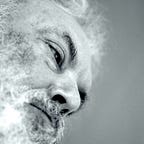12 Characteristics of the Daoist Sage
Note Using the male form in the narration of this text stands for using both the male and female forms, but is done to avoid an unnecessarily convoluted style.
I — Adaptability
The sage is adaptable, he is mentally flexible. He does not insist upon a certain direction to take, in whatever he does. He goes with the flow, he is creatively ‘undirected’ and ‘unintentional’ for he does not believe in what nowadays is called a ‘purposeful life.’ He questions that there is something like a single direction in life called ‘purpose’ or ‘ultimate goal’ or else, single focus. He adapts to circumstances as water adapts to the level of the landscape that it passes through.
II — Blitheness
Blitheness is defined by Merriam-Webster as ‘casual and cheerful indifference.’ The sage is blithely in the sense that he is a joyful absentee from any kind of involvement in matters that lead to attachment and sorrow.
III — Dispassionateness
The stage is dispassionate, thereby avoiding emotional attachment, which leads to ego-inflation and dependence in relationships. The dispassionate nature of the sage, superficially looked at, can easily be mistaken for cynicism or deliberate ridicule, but is really different from these negative expressions.
IV — Genuineness
The sage is genuine and original, while today in our modern world most people are imitative and artificial. To be genuine requires one to be disinterested in hero worship, to be adamant to not recognize anybody as ‘especially important’ as today the media cult around billionaires, movie stars and famous entrepreneurs indulges in it on a daily basis. It means to see the basic human in every man or woman, a down-to-earth regard that does not bother if one is a genius, and another a simple worker or craftsman. In resisting to be ‘impressed’ by a particular person, the sage is able to keep the necessary distance to other humans so that his genuineness does not suffer from any bias that results from the overestimation of human capabilities.
V — Indiscriminateness
The sage is indiscriminate. He does not have preferences, knowing that obsessive focus on ‘choosing’ distorts genuine non-involvement in human affairs and results in a biased view of reality.
VI — Peacefulness
The sage is peaceful. He lives peacefully. He considers peace as the natural state of a human being who is spiritually awake and developed, as matter of respect for all life. Thus he avoids conflict, involvement in human affairs, entanglement with other people’s ‘purposeful’ living, or any action that would get him out of his center. Being peaceful, for the sage, means being centered in his own reality so as to not create waves of antagonism.
VII — Preparedness
The sage is always prepared. This he has in common with the warrior, thereby being a warrior-sage. There is a greater difference between a warrior and a non-warrior (ordinary person) than between a sage and a warrior. While the sage is a warrior of peace, he does not blame a warrior of war for he knows that preparedness is an essential quality of a person who is wide-awake and spiritually focused.
VIII — Self-Sufficiency
The sage is self-sufficient. He leads a thrifty lifestyle, he is frugal. He knows that the secret of prosperity is to be found in a parsimonious attitude, an avoidance of waste of any kind. But he is also spiritually self-sufficient which means he will not adopt any ‘religion’ as most other people do, but remain unbaptized, uncircumcised, unchurched — preserving the integrality of both his body and mind.
IX — Sustainability
The sage leads a sustainable life. All he does can brought forward over long strands of time without deteriorating. He intuitively knows about the functioning of living systems and systemic thinking. He therefore creates outcomes from his actions that are sustainable rather than subject to decay. That his away his actions are lasting over time and can be seen as lasting achievements after his transition to the higher dimension.
X — Unassumingness
The sage is unassuming. He does not attract attention to himself. This is an outflow of his modesty. He does not think of himself as special, but as ordinary, he avoids all false pretense, being plain and honest, straightforward and direct in his relating to others and his lifestyle.
XI — Uncompetitiveness
The sage defeats a spirit of competition. He does not compete and will not compete under any circumstances. He is sensitive enough to see the subtle roots of conflict in a competitive attitude, and the roots of even greater conflict in a competitive society. He knows that competition ultimately leads to spiritual impoverishment because the competitive lifestyle lacks a contemplative focus, being obsessed with an action focus that leads to the dispersement of grounding through a judgmental and superficial attitude.
XII — Unheroicness
The sage is unheroic, the contrary of a hero. He considers it a fundamental mistake in life to judge humans as being either heroes (winners) or followers (losers), then worshipping the first category and having pity with the second. From the sage’s point of view, this is sheer arrogance and an attitude that invites antagonism and conflict between people. Hero worship on a cultural, social level, as it is part and parcel of today’s postmodern culture, is considered by the sage as a cultural aberration from the path of nature which is not judging her creations in any way. The sage defeats being a hero himself by being unassuming, dispassionate, contemplative, humble, and uninvolved in human affairs other than his own plain and simple life. The sage knows that heroes define themselves by ‘having purpose in life,’ thereby being entangled by a mental concept or concepts, which acts counter to being genuine and free, creative and spontaneous, and childishly innocent which are qualities only the sage embodies.
